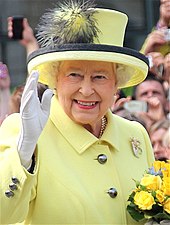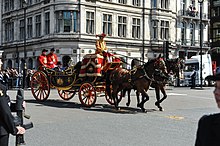
The House of Lords is the upper house of the Parliament of the United Kingdom. Like the lower house, the House of Commons, it meets in the Palace of Westminster in London, England. One of the oldest institutions in the world, its origins lie in the early 11th century and the emergence of bicameralism in the 13th century.

The Parliament of the United Kingdom of Great Britain and Northern Ireland is the supreme legislative body of the United Kingdom, and may also legislate for the Crown Dependencies and the British Overseas Territories. It meets at the Palace of Westminster in London. Parliament possesses legislative supremacy and thereby holds ultimate power over all other political bodies in the United Kingdom and the Overseas Territories. While Parliament is bicameral, it has three parts: the sovereign, the House of Lords, and the House of Commons. The three parts acting together to legislate may be described as the King-in-Parliament. The Crown normally acts on the advice of the prime minister, and the powers of the House of Lords are limited to only delaying legislation.

The Palace of Westminster is the meeting place of the Parliament of the United Kingdom and is located in London, England. It is commonly called the Houses of Parliament after the House of Commons and the House of Lords, the two legislative chambers which occupy the building. The palace is the centre of political life in the United Kingdom; "Westminster" has become a metonym for the UK Parliament and the British Government, and the Westminster system of government commemorates the name of the palace. The clock bell in the Elizabeth Tower of the palace, nicknamed Big Ben, is a landmark of London and the United Kingdom in general. The Palace of Westminster has been a Grade I listed building since 1970 and part of a UNESCO World Heritage Site since 1987.

The monarchy of the United Kingdom, commonly referred to as the British monarchy, is the form of government used by the United Kingdom by which a hereditary monarch reigns as the head of state, with their powers regulated by the British Constitution. The term may also refer to the role of the royal family within the UK's broader political structure. The current monarch is King Charles III, who ascended the throne on 8 September 2022 upon the death of Queen Elizabeth II, his mother.

A speech from the throne, or throne speech, is an event in certain monarchies in which the reigning sovereign, or their representative, reads a prepared speech to members of the nation's legislature when a session is opened. The address sets forth the government's priorities for its legislative agenda, for which the cooperation of the legislature is sought. The speech is often accompanied by formal ceremony. It is often held annually, although in some places it may occur more or less frequently, whenever a new session of the legislature is opened.
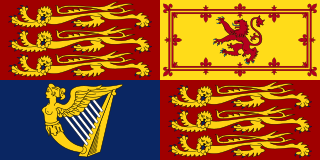
The royal standards of the United Kingdom are presently either of two similar flags used by King Charles III in his capacity as sovereign of the United Kingdom, the Crown dependencies, and the British Overseas Territories. Two versions of the flag exist, one for use within Scotland and the other for use elsewhere.
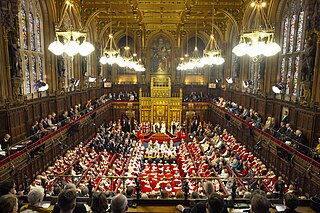
The State Opening of Parliament is a ceremonial event which formally marks the beginning of each session of the Parliament of the United Kingdom. At its core is His Majesty's "gracious speech from the throne", which is read by the monarch but written by HM Government. In the speech the monarch gives notice of forthcoming state visits, before setting out the government's legislative programme for the new parliamentary session. No business of either House of Parliament can proceed until the Sovereign’s speech has been delivered.

Dennis Edward Skinner is a British former politician who served as Member of Parliament (MP) for Bolsover for 49 years, from 1970 to 2019. A member of the Labour Party, he is known for his left-wing views and republican sentiments. Before entering Parliament, he worked for more than 20 years as a coal miner.

The monarchy of Jamaica is a system of government in which a hereditary monarch is the sovereign and head of state of Jamaica. The current Jamaican monarch and head of state, since 8 September 2022, is King Charles III. As sovereign, he is the personal embodiment of the Jamaican Crown. Although the person of the sovereign is equally shared with 14 other independent countries within the Commonwealth of Nations, each country's monarchy is separate and legally distinct. As a result, the current monarch is officially titled King of Jamaica and, in this capacity, he and other members of the royal family undertake public and private functions domestically and abroad as representatives of the Jamaican state. However, the monarch is the only member of the royal family with any constitutional role.
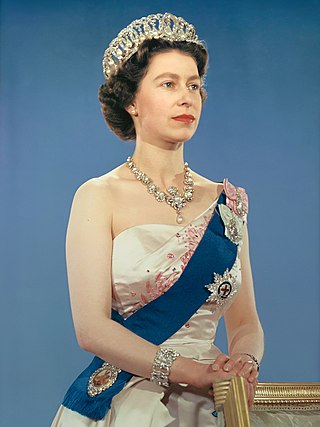
Elizabeth II was Queen of the United Kingdom and other Commonwealth realms from 6 February 1952 until her death in 2022. She was queen regnant of 32 sovereign states over the course of her lifetime and remained the monarch of 15 realms by the time of her death. Her reign of 70 years and 214 days is the longest of any British monarch or female monarch, and the second-longest verified reign of any monarch of a sovereign state in history.
In the UK and certain other Commonwealth countries, King's Consent is a parliamentary convention under which Crown consent is sought whenever a proposed parliamentary bill will affect the Crown's own prerogatives or interests. Prince's Consent is a similar doctrine, under which consent of the Prince of Wales must be obtained for matters relating to the Duchy of Cornwall. King's or Prince's Consent must be obtained early in the legislative process, generally before parliament may debate or vote on a bill. In modern times, following the tenets of constitutional monarchy, consent is granted or withheld as advised by government.

The finances of the British royal family come from a number of sources. The British government supports the monarch and some of his family financially by means of the Sovereign Grant, which is intended to meet the costs of the sovereign's official expenditures. This includes the costs of the upkeep of the various royal residences, staffing, travel and state visits, public engagements, and official entertainment. Other sources of income include revenues from the Duchies of Lancaster and Cornwall, income from assets of other trusts, income from private investments, and a parliamentary annuity.

Monarchy: The Royal Family at Work is a fly on the wall documentary TV series made by the BBC and RDF Media which follows the British Royal Family over the course of a year.
Operation London Bridge was the funeral plan for Queen Elizabeth II. The plan included the announcement of her death, the period of official mourning, and the details of her state funeral. The plan was created as early as the 1960s and revised many times in the years before her death in September 2022.
On 28 August 2019, the Parliament of the United Kingdom was ordered to be prorogued by Queen Elizabeth II on the advice of the Conservative prime minister, Boris Johnson—advice which was later ruled unlawful. The prorogation, or suspension, of Parliament was to be effective from some point between 9 and 12 September 2019 and would last until the State Opening of Parliament on 14 October 2019. As a consequence, Parliament was suspended between 10 September and 24 September 2019. Since Parliament was to be prorogued for five weeks and reconvene just 17 days before the United Kingdom's scheduled departure from the European Union on 31 October 2019, the move was seen by many opposition politicians and political commentators as a controversial and unconstitutional attempt by the prime minister to avoid parliamentary scrutiny of the Government's Brexit plans in the final weeks leading up to Brexit. Johnson and his Government defended the prorogation of Parliament as a routine political process that ordinarily follows the selection of a new prime minister and would allow the Government to refocus on a legislative agenda.

R (Miller) v The Prime Minister and Cherry v Advocate General for Scotland, also known as Miller II and Miller/Cherry, were joint landmark constitutional law cases on the limits of the power of royal prerogative to prorogue the Parliament of the United Kingdom. Argued before the Supreme Court of the United Kingdom in September 2019, the case concerned whether the advice given by the prime minister, Boris Johnson, to Queen Elizabeth II that Parliament should be prorogued in the prelude to the United Kingdom's withdrawal from the European Union was lawful.

A State Opening of the Parliament of the United Kingdom took place on 10 May 2022. Charles, Prince of Wales, and Prince William, Duke of Cambridge, opened the third session of the 58th Parliament on behalf of Queen Elizabeth II with the traditional Queen's Speech. It was the first State Opening at which two Counsellors of State acted on behalf of the monarch.
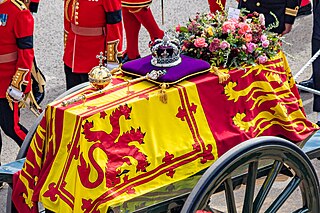
Elizabeth II, Queen of the United Kingdom and the other Commonwealth realms, died on 8 September 2022 at Balmoral Castle in Scotland, at the age of 96. Elizabeth's reign of 70 years and 214 days was the longest of any British monarch. She was succeeded by her eldest son, Charles III.

A State Opening of the Parliament of the United Kingdom took place on 7 November 2023 when King Charles III opened the fourth session of the Parliament elected in 2019, which was the last before the 2024 general election. Charles III delivered the King's Speech, his first as monarch, and set out the UK government's legislative programme for the following parliamentary session.

A State Opening of the Parliament of the United Kingdom took place on 17 July 2024 when King Charles III opened the first session of the Parliament elected in 2024, which was the first after the 2024 general election. Charles III delivered the King's Speech, his second as monarch, and the first since returning to his public duties after receiving treatment for cancer earlier in the year. The King set out the UK government's legislative programme for the following parliamentary session.
